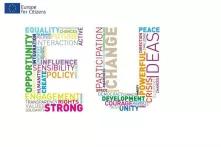
Over the last decades, the European Union has made progress in gender equality, yet numerous challenges remain. The continuing economic, social, and political crises mean that we still have a long way to go before gender policies have been thoroughly implemented. Our debate forums and publications are guided by a European emancipatory gender policy and aim to further develop and deepen past achievements.
With a wide range of formats, including interviews, video, commentary, as well as conferences and panel discussions we are trying to cover a great diversity of issues, such as the different consequences the crisis has for women and men, the gulf between demands for equal opportunities on the one hand, and for greater efficiency on the other, and the effects of labour market and employment policies on the development of democratic gender conditions.
Women and Solidarity. Where Did We Come From? Where Will We Go?
Conference
Warsaw, Poland, June 2014
The Polish trade union Solidarność emerged in 1980 out of strikes and was a decisive factor in the democratic revolution of 1989. Nevertheless, the commitment of women, who made up about half the membership, today is almost forgotten. Especially after Solidarność was banned in 1981, women continued activities underground. The conference addressed the situation of women in Poland before and after the transformation with speakers who are either researching the resistance movement, or who were personally involved in it.
- Invitation / programme / documentation (Polish / English)
- Film documentation: Solidarnosc Wedlug Kobiet (poln.) Trailer
“Rainbow Families” in Poland
Discussion meeting
Warsaw, Poland, June 2014
In Poland and Germany, “rainbow families” is a term used for a type of family with at least one gay or lesbian parents or parents identifying with the LGBT community. The event highlighted the challenges such families are facing in Poland, and outlined some possible social, political, and legal perspectives.
- Programme (Polish) / Magazine Replika
Europe, a Gender Equality Project?
Conference
Berlin, Germany, March 2014
Over the last decades the EU has made progress in gender equality, yet numerous challenges remain. The continuing economic, social, and political crises mean that many member states still have a very considerable distance to cover. The conference aimed to take stock of gender and equal opportunities policies and define new approaches towards an emancipatory European gender policy, with the main emphasis on human trafficking, sexual slavery, and peace and refugee policy.
- Invitation / Documentation (German)
Europe, a Gender Equality Project?
Web Dossier
Warsaw, Poland
Gender equality is a key tenet of European law. The EU and the European Parliament have given key aspects of gender equality policy a boost. In what ways does the EU promote and enforce gender equality? What steps have been taken and were they successful? What are the challenges over the next few years? And what will be the main obstacles? These are some of the questions discussed in our web dossier.
- Dossier (German)
The European Union – Hope and Reality. A Woman’s Perspective
Conference
Warsaw, Poland, May 2014
This year, ten countries celebrated the tenth anniversary of EU membership. Accession did not only affect their economies and cross-border travel, it also changed their legal systems in a variety of ways. Did hopes about European integration come true? In what ways has the situation changed for men and for women? At our conference, the results of a number of reports and studies by experts from Poland and the Czech Republic, who have researched the effects ten years of EU membership has had on gender relations, were presented.
- Audio (Mixcloud) / video (Youtube) / programme (Polish)
10 Years in the EU from Gender Perspective. Achievements and Shattered Hopes
Analyses, Debates and Web dossier
The project is aimed at assesssing 10-years of Polish, Czech and Slovakian membershop in the EU from gender perspective. It will explore to what extend hopes and expectations related to the European integration have been met and what was the impact od the EU accession on the situation of women and men. Gender experts from Poland, Czech Republic and Slovakia will be asked to develop two types of analyses. Firstly analyses which will focus on gender assessment of 10-years membership in the EU; and secondly analyses wich will access activity and contribution of female MEP's from Poland, Czech Republic and Slovakia in 2004-2010.
- Analyses/ Reports (poln.) / Web dossier (engl.)
- Invitation to the debate at the 6th Womens Congress: "10 Years in the European Union in the Eyes of Women. Hopes vs. Reality"
Articles: - "Gender equality in Poland after EU accession. Expectations and reality" by Magdalena Grabowska
- "Full Speed ahead, in reverse gear" by Anna Dryjańska
- "The European Union – accelerator or brake for gender equality in the Czech Republic?" by Kristýna Ciprová Alexandra Doleželová
- "Achievements and Failures of Female MEPs from the Czech Republic: 10 Years in the EU from a Gender Perspective" by Veronika Šprincová
- "Gender Equality as Issue with Content and Context. Ten years of Slovakia's Membership of the European Union" by Zuzana Madarova
- "Activities of Female MEPs from Slovakia" by Alexandra Ostertagova
